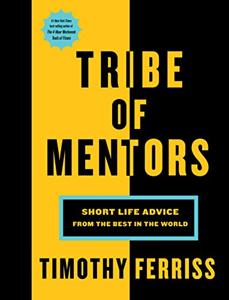
Want to learn the ideas in Tribe Of Mentors better than ever? Read the world’s #1 book summary of Tribe Of Mentors by Tim Ferriss here.
Read a brief 1-Page Summary or watch video summaries curated by our expert team. Note: this book guide is not affiliated with or endorsed by the publisher or author, and we always encourage you to purchase and read the full book.
Video Summaries of Tribe Of Mentors
We’ve scoured the Internet for the very best videos on Tribe Of Mentors, from high-quality videos summaries to interviews or commentary by Tim Ferriss.
1-Page Summary of Tribe Of Mentors
Overview
Tribe of Mentors is a book about the best ways to live and succeed in life. It contains advice from 140 mentors, who are successful people in different fields. The book was compiled by Timothy Ferriss, an entrepreneur and investor who also has knowledge on fitness and productivity. He asked 11 questions to his mentors for answers that comprise most of this 649-page book.
The author interviewed eleven people and asked them about their career advice, what quote they would write on a giant billboard, and how they deal with work. They were also asked whether or not they would go back to school if they could do it again. The author asks the interviewees about which part of their life has been most beneficial to them and why, what investments have allowed them to get ahead in life, as well as what lessons did professional defeats teach them over time that led to success.
Many of the mentors agree that hard work is the key to success. They also believe that focusing on a personal passion and learning from failures are equally important. Most of them meditate, and most feel that physical health is just as important as mental health. The majority value investments in relationships, education, and health. They recommend several books; Man’s Search for Meaning (1946) by Viktor Frankl is one of them.
One of the main lessons from this book is that we can control our own lives.
Key Point 1: Hard work is the main driver of success.
In order to get ahead, many of the people interviewed by Ferriss advise that you should work as hard as possible. The only ones who say it’s not important are life coach Marie Forleo and Tony Robbins.
It’s obvious that hard work leads to success. However, there are psychological reasons why successful people tend to attribute their accomplishments solely to individual effort and fail to factor in chance and social position. Cornell University economist Robert Frank explains some of these cognitive biases in his book Success and Luck: Good Fortune and the Myth of Meritocracy (2016). The halo effect is a phenomenon where an impression of one particular aspect of a person’s life influences perceptions about other aspects. For example, people regarded as successful are often perceived—by themselves and others—as smart or talented. Attribution bias is another reason people misplace credit for making it big.
The brain is more willing to accept success as the result of personal agency. People who do well often worked hard, and it’s easier for us to remember that fact than some external factor. The mentors who tell you to work hard are probably unaware of their biases and factors beyond their control.
Key Point 2: Failure paves the way for success.
Some people have found that failing to achieve a goal can be an opportunity for personal growth. It can give them time and space to think about what they really want in life, and it can help them become stronger people. Failing at something can also lead to rejection, which gives you the chance to strike out on your own, build inner strength, and develop character.
In the U.S., race plays a role in determining who gets to move on after experiencing failure. White people are more likely to experience success after failing, while black people often don’t get second chances because of their criminal records. A study from Johns Hopkins University tracked 800 children for 25 years and found that poor white kids used drugs at similar rates as poor black kids, but were less likely to be arrested for drug-related crimes than black children. This is significant because when you’re labeled a criminal at an early age, it’s hard to get employment later in life.






